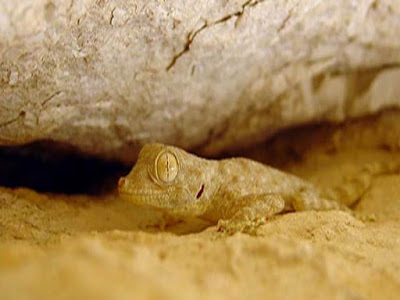1.
Ptyodactylus guttatus
Guy Sion, Hebrew University, Dept. of
Ecology, Evolution & Behavior
2.
Oculina patagonica
Rachel Armoza- Zvulani, Tel Aviv
University, Dept. of Zoology
3.
Mandrillus sphinx
Yael Tal-Nissim, Hebrew University Vet.
School
(from Wizards of Beverly Place)
Ptyodactylus guttatus
Aggressive geckos use their left eye as this
information goes directly to the aggressive right brain. We are investigating if this agression is
associated with higher hormone levels.
Oculina patagonica
In this study we compared reproductive characteristics
and steroid hormone levels in the non-indigenous scleractinian coral, Oculina
patagonica, inhabiting contaminated vs. uncontaminated reference sites
along the Israeli Mediterranean coast. Our results indicate significantly
higher steroid levels in both seawater and coral tissue samples from
contaminated sites as compared to reference sites, suggesting that corals tend
to accumulate steroids from the surrounding waters. Despite their higher
steroid levels, corals from the contaminated sites showed reproductive
potential comparable to those of the reference sites. Interestingly, a clear
distinction could be seen between corals exposed to pollution for long vs.
short durations, with the latter showing a failure to complete gametogenesis.
This suggests that reproduction in O. patagonica is susceptible to acute
rather than chronic stress. The involvement of acclimatization/ adaptation
processes may explain this species tolerance, and may reflect the ability of O.
patagonica to successfully invade new areas in the Mediterranean Sea.
Armoza-Zvuloni, R., Kramarksky-Winter, E., Rosenfeld, H., Shore, L. S., Segal, R., Sharon, D., Loya, Y. (2012). Reproductive characteristics and steroid levels in the scleractinian coral Oculina patagonica inhabiting contaminated sites along the Israeli Mediterranean coast. Marine Pollution Bulletin 64 (8): 1556-1563
http://dx.doi.org/10.1016/j.marpolbul.2012.05.020
Mandrillus sphinx
Although mandrils are an endangered
species in the wild, they breed too well in captivity. In order to determine the best contraceptive
protocol using a GnRH agonist, fecal steroids were determined before and after
implantation of the agonist.





No comments:
Post a Comment